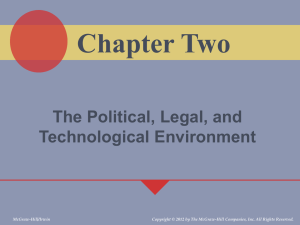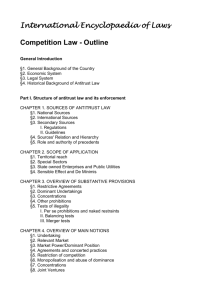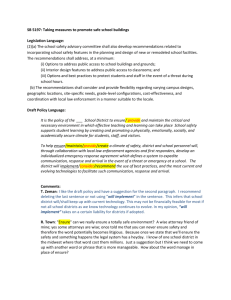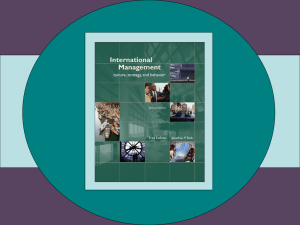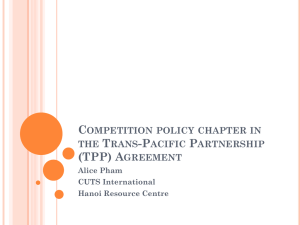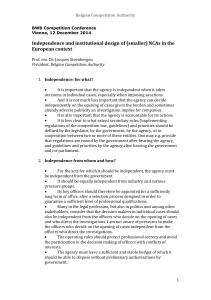American Bar Association, Antitrust Section and International
advertisement
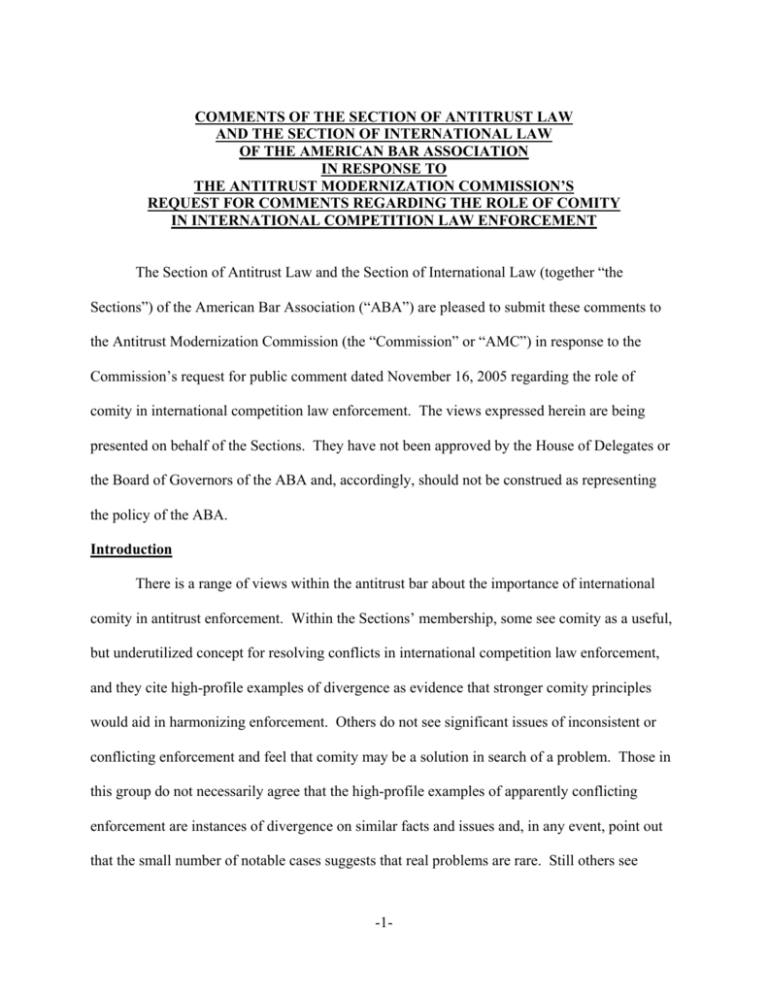
COMMENTS OF THE SECTION OF ANTITRUST LAW AND THE SECTION OF INTERNATIONAL LAW OF THE AMERICAN BAR ASSOCIATION IN RESPONSE TO THE ANTITRUST MODERNIZATION COMMISSION’S REQUEST FOR COMMENTS REGARDING THE ROLE OF COMITY IN INTERNATIONAL COMPETITION LAW ENFORCEMENT The Section of Antitrust Law and the Section of International Law (together “the Sections”) of the American Bar Association (“ABA”) are pleased to submit these comments to the Antitrust Modernization Commission (the “Commission” or “AMC”) in response to the Commission’s request for public comment dated November 16, 2005 regarding the role of comity in international competition law enforcement. The views expressed herein are being presented on behalf of the Sections. They have not been approved by the House of Delegates or the Board of Governors of the ABA and, accordingly, should not be construed as representing the policy of the ABA. Introduction There is a range of views within the antitrust bar about the importance of international comity in antitrust enforcement. Within the Sections’ membership, some see comity as a useful, but underutilized concept for resolving conflicts in international competition law enforcement, and they cite high-profile examples of divergence as evidence that stronger comity principles would aid in harmonizing enforcement. Others do not see significant issues of inconsistent or conflicting enforcement and feel that comity may be a solution in search of a problem. Those in this group do not necessarily agree that the high-profile examples of apparently conflicting enforcement are instances of divergence on similar facts and issues and, in any event, point out that the small number of notable cases suggests that real problems are rare. Still others see -1- convergence, both substantive and procedural, as a more valuable pursuit and note the practical difficulties in implementing comity principles. From this perspective, efforts towards comity may be a misallocation of resources or even counterproductive to the extent that some divergence may provide a healthy dialectic. Finally, there is also a concern that some jurisdictions may misperceive efforts by U.S. antitrust agencies to promote comity principles as an extraterritorial attempt to impose U.S. antitrust law on foreign competition regimes. There also is some general recognition, as is reflected in the Commission’s request for comments, that the combination of an increasingly global economy and the proliferation of competition regimes around the world increases the likelihood of inconsistent or conflicting competition law enforcement. This in turn may lead to greater uncertainty for companies that do business globally and may discourage transactions and conduct that are procompetitive. In this context, comity principles could be useful in harmonizing international competition law enforcement and avoiding at least some instances of harmful divergence. In its Comments Regarding Commission Issues for Study, 1 the Section of International Law suggests that the Commission should consider whether: (1) an issue raises specific concerns and (2) such concerns are appropriate for legislative or administrative resolution. To the extent the Commission concludes that lack of comity may create difficult situations for both businesses and competition authorities, the Sections offer the following comments regarding the strengthening of principles of international comity as a means to address these concerns. Although the Sections’ suggestions below may not be appropriate for legislative resolution, they may inform a useful dialog among competition law enforcers. 1 Comments Regarding Commission Issues for Study Submitted to the Antitrust Modernization Commission by the Section of International Law of the American Bar Association, September 30, 2004. http://www.amc.gov/comments/abainternationalsec.pdf -2- Given the range of views within the Sections’ membership, these comments do not endorse any particular approach to strengthen comity considerations. As discussed further below, these comments suggest that enhanced comity -- comity principles or guidelines that extend traditional notions of negative and positive comity 2 -- may be an effective tool for dealing with divergent enforcement across jurisdictions in some circumstances. This may be true whether or not the competition regimes in question have achieved general convergence on their substantive competition laws. These comments also offer several specific approaches for achieving enhanced comity. It is not the purpose of these comments to express any final view about the exact role comity principles should play in the future or the mechanisms that might be used to encourage or implement these principles. These comments are limited to proposing areas for study and where the United States can work with authorities in other countries to advance principles of comity as appropriate. At the same time, the Sections recommend that the United States should remain sensitive to the particular interests other jurisdictions may have in enforcing their competition laws and should provide other jurisdictions comfort that comity is a “two-way street” and that, in appropriate cases, the U.S. antitrust agencies will respect the greater interests and expertise of their fellow competition authorities. In addition, the Sections are not proposing that comity be a substitute for continued focus on harmonization; rather comity is another option to harmonize better parallel enforcement actions. The Costs of Divergence Procedural and substantive differences in competition laws around the world invariably lead to conflicts in the enforcement of those competition laws. Even with increasing 2 Applying negative comity, a jurisdiction will take into consideration the acts and important interests of another jurisdiction before taking action that may affect the other jurisdiction. Under positive comity, one jurisdiction requests another jurisdiction to take affirmative action to assist it in enforcing its laws. -3- convergence among different competition regimes, multiple reviews by multiple authorities can lead to different outcomes and also may be an inefficient use of resources for the parties and the competition authorities involved, particularly in cases involving the same facts or competitive effects. The most serious adverse consequences include: • forum shopping, whereby a complainant seeks out the jurisdiction that will impose the broadest and most stringent requirements on a competitor; • situations in which the most restrictive regulatory regime or standard prevails no matter what action other jurisdictions take or decide not to take; • conflicting or inconsistent remedies, which result in uncertainty, impedes business planning, skews investment decisions, and promotes inefficiency; • inefficiencies arising from inconsistent or divergent procedural and transaction-timing requirements in the merger review context; and • misallocation and waste of legal and administrative resources by competition authorities undertaking duplicative reviews or trying to resolve conflicts with other authorities. These consequences impose real costs on business, consumers, and government. The increasing number of competition regimes now in effect (with more than 100 countries currently having some form of competition law) makes these concerns substantial and ever more likely to arise. In addition, growing economic activity among jurisdictions with active competition law enforcement increases the likelihood of significant ripple effects in other jurisdictions from any one jurisdiction’s enforcement decisions. Different jurisdictions also may have different policies and policy goals with respect to economic growth and development which can affect their competition law enforcement and lead to divergence. These factors also create uncertainty in the business community regarding likely enforcement approaches. This uncertainty may compound the problem by inhibiting firms from undertaking otherwise efficient economic activity that would benefit not only their business, but also economic development and consumer welfare. -4- The Current Role of Comity in International Competition Law Enforcement U.S. and other competition authorities generally recognize the importance of comity as a consideration in minimizing the cost of divergence in competition law enforcement. In addition, numerous bilateral agreements reflect comity principles, both negative and positive. However, these general comity principles, without more development of when and how to implement comity considerations, leave substantial room for inefficient competition law enforcement. Traditional, or negative, comity relates to the degree of consideration a domestic agency or tribunal gives to an act or decision of a foreign government. As early as 1895, the U.S. Supreme Court explained that comity is “the recognition which one nation allows within its territory to the legislative, executive, or judicial acts of another nation, having due regard both to international duty and convenience, and to the rights of its own citizens, or of other persons who are under the protection of its laws.” 3 Consistent with comity principles, the U.S. Supreme Court recently has recognized the importance of avoiding “unreasonable interference” with the interests and authority of other sovereign nations in the antitrust context. 4 Thus, negative comity embodies the principle that one sovereign should recognize the important interests of other sovereigns and should seek to avoid harming those important interests when it acts. Accordingly, in the competition law context, the 1995 Recommendation of the OECD Council, Cooperation Between Member Countries on Anticompetitive Practices Affecting International Trade, describes negative comity as the principle that a country should notify other countries when its competition law enforcement proceedings may affect their important interests and give full and sympathetic consideration to possible ways of fulfilling its 3 4 Hilton v. Guyot, 159 U.S. 113, 164 (1895). See F. Hoffman-La Roche Ltd. v. Empagran S.A., 542 U.S. 155, 164-69 (2004). -5- enforcement needs without harming those interests. Respect for the interests of others and moderation, to the extent possible, lie at the heart of traditional comity in such circumstances, but it does not entail abdication of jurisdiction. While negative comity involves restraint to avoid harm to the important interests of other sovereigns, positive comity implies an affirmative effort to assist other sovereigns. Thus, in the competition law context, positive comity would permit one jurisdiction to request that another jurisdiction take appropriate action against anticompetitive behavior occurring within its territory that affects the requesting jurisdiction’s important interests. Former European Commissioner Karel Van Miert explained the importance of comity in the global marketplace: [R]emedies adopted by an antitrust agency in order to ensure competition within its jurisdiction may seem legitimate, but may sometimes adversely affect the interests of another country. They may also directly conflict with remedies adopted in the same case by another authority. To overcome these difficulties we need to take into consideration each other’s concerns and, to the fullest extent possible, devise remedies compatible with one another’s and coherent throughout the relevant market. Failing to do so gives private parties the opportunity to pit antitrust enforcers against each other. We risk also treating companies in an inefficient manner or making them suffer fragmentary and incoherent solutions imposed upon them by antitrust authorities ignoring each other. . . . Comity is not, as a learned judge held recently in this country, a mere “aspiration”: it is a rule which governs our international relations. 5 5 Karel Van Miert, International Cooperation in the Field of Competition: A View from the EC, before the Fordham Corporate Law Institute 24th Annual Conference on International Law & Policy (Oct. 16, 1997), available at http://europa.eu.int/comm/competition/speeches/text/sp1997_073_en.html. -6- Furthermore, former Assistant Attorney General R. Hewitt Pate stressed the importance of comity in minimizing the negative effects of conflicting antitrust actions and also expressed his view that comity is a realistic goal: Comity – a certain degree of trust in each other’s systems – is a realistic goal, however, and one that will become even more important as antitrust enforcement regimes spread around our shrinking world. . . . When a competent authority in a jurisdiction with which the parties have a particularly strong connection rules in a case, especially in situations where the relevant market conditions in other jurisdictions are similar to those that prevail in the jurisdiction that has acted on the deal, the global antitrust community should be willing to take “No” – or “Yes,” for that matter – for an answer. . . . [W]hen a jurisdiction is trying to determine what action to take, it surely must count for something under basic principles of comity that a competent system with a clear nexus to a matter has already made a full effort to address it and has already come to a result. 6 The U.S. and EU competition authorities long have recognized the importance of cooperation and comity in the application of their competition laws. In 1991, the U.S. government and the European Commission entered into an agreement “Regarding the Application of Their Competition Laws.” 7 Article VI of this agreement reflects a negative comity principle: each party undertakes to take into account the important interest of the other party in the enforcement of its competition laws. Article V reflects a positive comity principle: either party can ask the other party to take appropriate actions regarding anticompetitive behavior occurring in its territory that affects the important interest of the requesting party, where that behavior violates the competition laws of the host party. In 1998, the United States 6 R. Hewitt Pate, Current Issues in International Antitrust Enforcement, before the Fordham Corporate Law Institute 31st Annual Conference on International Antitrust Law & Policy (Oct. 7, 2004), available at http://www.usdoj.gov/atr/public/speeches/206479.pdf. 7 Agreement Regarding the Application of Their Competition Laws, U.S.-EC, Sept. 23, 1991, available at http://www.usdoj.gov/atr/public/international/docs/0525.pdf. -7- and European Commission entered into an agreement on the “Application of Positive Comity Principles in the Enforcement of their Competition Laws.” 8 This agreement sought to clarify when positive comity could be invoked by either party and the mechanics of its application. The United States also has bilateral antitrust cooperation agreements with Canada, Germany, Australia, Brazil, Israel, Japan, and Mexico. 9 In addition to providing for cooperation, coordination, and information sharing between the relevant competition authorities, these agreements also reflect principles of negative and positive comity. The U.S.-EC agreements and the U.S.’s bilateral antitrust cooperation agreements have promoted cooperation and information sharing. However, the comity provisions have found less application. Although these agreements clearly recognize the importance of comity in the international antitrust enforcement context, the lack of more explicit principles or guidelines for the application of those principles may impede the achievement of the full benefits of comity. Enhanced Comity as an Option These comments suggest that the U.S. antitrust agencies should consider enhanced comity mechanisms as a guide to the exercise of comity in at least some cross-border competition law enforcement situations. Although perhaps less valuable in hard-core cartel cases, enhanced comity mechanisms could be beneficial both in merger and conduct investigations and could be applied in decisions whether to initiate an investigation, in the pursuit and timing of investigations, and in consideration of possible remedies and resolutions. Some divergence in enforcement likely is inevitable, but enhanced comity mechanisms that 8 Agreement on the Application of Positive Comity Principles in the Enforcement of their Competition Laws, U.S.-EC, Mar. 6 – June 4, 1998, available at http://www.usdoj.gov/atr/public/international/docs/1781.pdf. 9 These agreements can be accessed at http://www.usdoj.gov/atr/public/international/int_arrangements.htm. -8- encourage respect for the enforcement decisions of the competition authority best positioned to analyze the matter and with the most at stake may serve to ameliorate conflicts arising from such divergence. Some criticize comity as carrying an implied duty of deference and as not being an effective or necessarily desirable way of avoiding divergence. In particular, one prominent commentator recently suggested that different jurisdictions have legitimate interests to protect and that engagement and cooperation through collaboration and discussion is the best way to protect those interests while promoting efficient enforcement. 10 That commentator also argues that strong comity principles may lead to a presumption of deference which could undermine engagement and cooperation. In addition, comity principles often may be ineffectual, and even where they are invoked, the application can be unpredictable and sometimes politically motivated. Rather than ameliorating divergence, comity may instead undermine the clarity and certainty of the law. These comments agree that comity would not be a substitute for substantive harmonization or cooperation and collaboration among competition authorities. Such harmonization, cooperation agreements, and engagement among affected jurisdictions are valuable and may avoid inconsistent or conflicting enforcement in many cases. Such results are preferable to an exercise of deference because no jurisdiction need compromise in its enforcement out of consideration of the interests of others. Comity principles can be useful, however, where complete harmonization of enforcement through engagement is not possible. This may be true even if the jurisdictions involved achieve 10 See E. Fox, Extraterritoriality in the Age of Globalization; Conflict and Comity in the Age of Empagran, Antitrust Report, October 2005, p.3. -9- general substantive convergence. Applying the same substantive law, reasonable minds still may differ about appropriate enforcement actions (as evidenced by the fact that not all Federal Trade Commission votes are unanimous). This suggests that many times there may be multiple “right” results and that any one of those results may be superior to two or more of them simultaneously. Under these circumstances, if a competition authority well positioned to analyze a matter has made an enforcement decision, subsequent enforcement activity in relation to the same matter (involving the same facts and competitive effects) by other competition authorities may not produce superior results and instead may be inefficient or counterproductive. In addition, harmonization of enforcement through engagement may not always be optimal. An exercise of comity may be more efficient where one jurisdiction’s interests and qualifications are relatively slight compared to another’s. In such situations, the competition authority in the jurisdiction with slight interests might appropriately give due consideration and respect to the enforcement decisions of the jurisdiction with greater interests and not undertake its own investigation. Where comity principles have a role to play, the shortcomings identified in the current application of comity are the very reasons the U.S. antitrust agencies might pursue enhanced comity mechanisms. These enhanced comity mechanisms need not lead to an obligation or presumption toward deference. Competition authorities would remain free to take enforcement action where their important interests are at stake, but before they decide on a course of action, enhanced comity mechanisms could facilitate and guide their application of comity under specific circumstances. Avoiding conflicts resulting from overlapping enforcement through enhanced comity mechanisms also would increase the predictability and clarity of competition law enforcement and reduce the potential for political influence. -10- Enhanced Comity in Non-Antitrust Contexts Experience with enhanced comity in other areas of law reinforces the efficacy of this approach. Much like international antitrust enforcement, other transnational sectors present complex cross-border enforcement problems that require balancing the policy and enforcement interests of the jurisdictions involved, as well as the interests of the regulated entities. In some of these sectors, enhanced comity mechanisms have been implemented to deal with the conflicts that inevitably arise. These transnational comity mechanisms can serve as useful models for the transnational enforcement of antitrust law. For example, the Bankruptcy Abuse Prevention and Consumer Protection Act of 2005 incorporated the Model Law on Cross-Border Insolvency into U.S. bankruptcy law. 11 The Act provides for the recognition of foreign insolvency proceedings, which entitles the foreign bankruptcy representative to participate in U.S. bankruptcy proceedings and other forms of relief, and for cooperation and direct communication between U.S. courts and trustees and foreign courts and representatives. In particular, if there are no bankruptcy proceedings pending in the United States, but there are multiple foreign insolvency proceedings formally recognized by U.S. courts, U.S. courts are charged with granting relief to the foreign representative consistent with the recognized proceedings occurring in the country where the debtor’s center of interest is located. If the only recognized foreign proceedings are outside of the debtor’s center of interest, U.S. courts are to act to facilitate coordination of the proceedings. 12 Thus, these recently enacted bankruptcy provisions reflect three important enhanced comity principles: non- 11 12 Pub. L. No. 109-8 § 801 (2005) (codified at 11 U.S.C. §§ 1501-1532). See 11 U.S.C. § 1530. -11- binding deference to a jurisdiction with a greater interest, avoidance of inconsistent remedies, and coordination of multiple proceedings. Other transnational sectors also have implemented enhanced comity mechanisms. The United States has entered into many so-called “Open Skies Agreements” with other countries. Under the model Open Skies Agreement, the parties can protest airline pricing practices in certain circumstances where one of them believes the practices are inappropriate or harmful to consumers. However, neither party can take action against such practices until they have consulted and agreed on the appropriate resolution. 13 These agreements thus illustrate instances where countries have agreed to consult and reach a consensus before taking action against pricing practices viewed by one of the parties as inappropriate or harmful. The Basel Convention governs the transborder shipment and disposal of hazardous wastes. 14 A party to the Convention can prohibit the importation of hazardous or other wastes for disposal, and other parties to the Convention are required to prohibit export of the prohibited waste to the prohibiting country. The Convention also establishes a notification and consent system for the exportation and importation of waste. Thus, the Basel Convention exemplifies an enhanced comity principle whereby under certain conditions one country ought to defer to the stronger interests of another country, even if it is against their interests (or the interests of companies domiciled within its borders) to do so. 13 See Current Model Open Skies Agreement art. 12.1, http://www.state.gov/e/eb/rls/othr/19514.htm. 14 Basel Convention of the Control of Transboundary Movements of Hazardous Wastes and Their Disposal, done Mar. 22, 1989, 1673 U.N.T.S. 125. -12- Specific Suggestions Businesses in all countries have an interest in seeing enhanced comity mechanisms among competition authorities implemented. The United States played a pioneering role in establishing the bilateral cooperation agreements discussed above. These agreements reflect comity principles in that the parties have agreed to limit their enforcement activities when foreign interests are involved. At a time when markets are becoming increasingly globalized and businesses are becoming subject to an increasing number of competition regimes, it is important that the United States take the lead developing and implementing enhanced comity mechanisms. Below, these comments list a variety of enhanced comity approaches for consideration. This list is not exhaustive, but is illustrative of possible means to achieve greater harmonization of enforcement through comity. Some approaches may be more feasible in the short term, and others may require additional groundwork before they become practical. In addition, the effectiveness of any of these options will depend on the extent to which other jurisdictions are willing to go along. In this regard too, some approaches may be more feasible than others, for example because cooperation agreements rarely permit the exchange of confidential information. 15 Finally, even if some competition authorities already achieve significant harmonization of enforcement by following some of these approaches informally, articulating these practices explicitly and making them more transparent nonetheless has value, especially in dealing with new and developing competition authorities. • Advocate consideration of comity in relevant multilateral organizations. The U.S. antitrust agencies could use existing multilateral organizations such as the ICN and the OECD as fora to continue to advocate the consideration of comity issues in today’s global enforcement environment, to raise awareness of the costs of divergent or 15 See OECD Best Practices for Formal Exchange of Information between Competition Authorities in Hard Core Cartel Investigations, November 2005. -13- conflicting competition law enforcement, and to discuss the application of comity mechanisms in other regulatory settings to competition law enforcement. • Update existing bilateral agreements and the 1995 OECD Recommendation’s Guiding Principles for Notifications, Exchanges of Information, Co-Operation in Investigations and Proceedings, Consultations and Conciliation of Anticompetitive Practices Affecting International Trade to make comity considerations more explicit. The 1998 U.S.-EU agreement, for example, recognizes that anticompetitive activities can impede global trade, investment flows, and consumer welfare. However, this agreement does not articulate the fact that divergent competition law enforcement also can impede these goals. This and other existing bilateral agreements could be amended to acknowledge explicitly the negative effects of divergent policies, enforcement, and inconsistent remedies and to call for serious consideration of comity principles to mitigate such adverse effects. • Develop mechanisms for consultation between competition authorities at the request of companies potentially subject to inconsistent or conflicting enforcement actions or merger reviews. Governments, potentially through bilateral agreements, could agree that their competition authorities will consult with each other at the request of companies making a credible showing that they may be subject to divergent or inconsistent substantive competition rules or remedies that may impair their ability to efficiently operate in the global marketplace. • Develop a clearance and coordination network for implementing comity. The U.S. agencies could take the initiative in establishing a network of competition authorities, similar to the European Competition Network, for implementing comity. This network could be an established channel for the coordination of enforcement actions and to inform appropriate exercises of comity. This could include designating a particular authority with the greatest expertise and interest taking the lead on a matter, facilitating discussion on enforcement perspectives, and harmonization of remedies. However, the challenges inherent in establishing such a network among a larger group of competition authorities with a broader range of competition rules and cultures than is present within the ECN may be significant. At the very least, a more structured approach than exists within the ECN probably would be necessary. The Sections recognize that there is some risk of the most aggressive authority among those involved taking the lead, with the result of the most onerous remedies prevailing, and believe that risk might be mitigated through increased coordination and understanding among competition authorities. Moreover, even if the most aggressive authority takes the lead, the result may still be superior to what would occur without any efforts at comity and each competition authority seeking its own remedy. • Develop the principle that jurisdictions with lesser interests and expertise should give due consideration and respect to actions taken by jurisdictions with greater interests and expertise. The United States, perhaps through bilateral agreements, could agree with its trading partners that where one jurisdiction's interests and experience are relatively slight there will be a strong presumption in favor of the enforcement decisions of the jurisdiction with greater interests and expertise. -14- If successful, the United States could extend this to a principle that, absent unique facts or considerations, enforcement decisions by the competition authority with the greatest interest and expertise in the transaction or conduct at issue normally will be respected by those with lesser interest or expertise. Jurisdictions would not give up their rights to differ on substantive competition rules and enforcement policies, however. In some situations, one jurisdiction may have important policies to satisfy even though another jurisdiction has a closer nexus. Moreover, where jurisdictions are investigating different conduct or different effects, the role of comity may be diminished. • Develop the principle that inconsistent remedies should be avoided and remedies should be coordinated. Governments, perhaps through bilateral agreements, could agree that, consistent with their respective competition laws, their competition authorities will not order remedies in cases involving the same facts and competitive effects that impose inconsistent or conflicting obligations on the companies involved. An alternative would be for competition authorities to agree to consult with one another prior to any authority imposing a remedy divergent from the action taken by an authority that previously investigated the same transaction or conduct while giving consideration to avoiding forum shopping. Where a single competition authority’s remedy does not suit all affected jurisdictions, those involved could agree to a procedure whereby their respective competition authorities jointly fashion an appropriate remedy. This occurred on an ad hoc basis in the General Electric-Instrumentarium merger review. The United States and European Commission made a clear effort when drafting their respective decrees to avoid creating inconsistent obligations. This effort included using the same definition of assets, drafting complementary common trustee provisions, and consulting during the divestiture process. Moreover, Canada elected to adopt the remedies imposed by the United States and European Commission. This practice could be institutionalized to a greater extent. Even if the result in some cases may be to aggregate the remedies sought by each authority that are not inconsistent, this still would be superior to having each authority seek separate, conflicting remedies. • Develop guidelines or thresholds for exercising comity. With experience, the U.S. agencies also could seek to develop non-binding but specific thresholds for the exercise of comity. These might apply size-of-commerce thresholds to articulate better when one jurisdiction's interests in a matter are sufficiently slight that it normally will respect the enforcement decisions of the jurisdiction with the greatest nexus to the matter. These could be implemented unilaterally or through bilateral agreements. The Sections are not advocating any particular mechanism or making definitive proposals. Rather, these possible approaches should be viewed as the beginning of a dialogue -15- among competition authorities with the goal of reaching agreement on appropriate mechanisms to fulfill the principles of comity. February __, 2006 -16-

